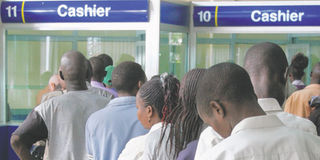Premium
Electricity bill to go up by 16pc this month

Consumers pay their electricity bills at a Kenya Power office. Photo/FILE
What you need to know:
- Kenya Power pays power producers in dollars. It sources funds from monthly payments for electricity consumption.
- The company passes on additional costs incurred during electricity generation such as those caused by fluctuation in foreign exchange rates and costs of fuel to end consumers in form of monthly adjustments of the components.
- A total of the difference in amount incurred for a particular month is divided by the total number of electricity units produced to get the average fuel and forex charge payable per every unit of electricity consumed.
Your electricity bill will go up by at least 16 per cent this month following a decision by Kenya Power to increase charges levied on the power.
In a legal notice published last Friday on the Kenya Gazette, Kenya Power tripled the foreign exchange levy from 76 cents to Sh2.80 and increased the fuel levy by 27 cents to Sh5.66 per unit.
The two are variable components of the monthly bill that the power distributor is allowed to adjust every month to take into account changes in international prices of crude oil, used in generating thermal power and fluctuations in the value of the local currency against the dollar.
“This computation is based on the amount of transactions that the sector underwent during the month under review. There was also the consideration of the value of the local currency against the dollar which Kenya Power uses to pay other institutions such as KenGen and the independent Power Producers so as to determine the difference that will be passed on to power consumers,” said Silas Cheboi, Kenya Power planning officer.
The new rates come at a time when the shilling is seen to stabilise against the dollar with statistics from the Central Bank of Kenya showing that the shilling has traded at a mean of Sh84 for the last three months.
Mid this month, the Energy Regulatory Commission (ERC) announced a decrease in pump prices for the third consecutive month meaning that fuel prices for use by the IPP has also fallen, rising questions on the need for increase.
“The new charges will definitely threaten the gains made in fighting inflation. We have not seen a huge fluctuation in foreign exchange and we do not understand what is informing the increase,” said Stephen Mutoro, secretary general of the Consumers Federation of Kenya.
Last month, consumers paid a Sh0.76 foreign exchange charge for every unit of electricity consumed down from Sh1.25 that was charged in June while that of fuel went down to Sh5.39 from Sh5.97.
This month’s adjustment is likely to strain budgets of most households as it comes at a time when ERC has hinted a possible increase in pump prices starting next month which if implemented will lead to an increase in the prices of goods and services whose provision is highly dependent on the product.




